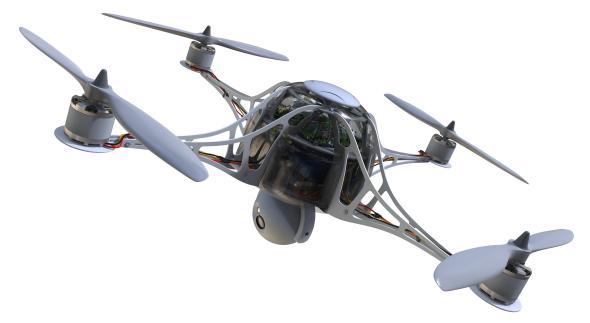Throughout May, as part of our fifth Futurography course, Future Tense focused on debates about the purportedly creepy qualities of drones. We published essays and articles by experts and academics on a wide range of topics, but we’re also interested in what you have to say. To that end, we’ve written up some of your answers to our survey on the topic. We hope you’ll follow along this month as we ask whether autonomous vehicles will force humans to give up their driver’s licenses.
Many Slate readers who responded to the survey argued that it’s a mistake to judge drones themselves, since they’re merely tools. “Drones aren’t creepy. The people operating them are creepy,” one typical respondent wrote, while another noted, “Drones are only as creepy as the person at the controls.” That’s not enough to dissuade everyone from their concerns, though, as others still find the actual devices unnerving. “I think it’s [the] insect-like quality that makes people uncomfortable,” one such respondent proposed. Such opinions seemed to be in the minority, however, with many more readers suggesting that drones are merely a fad or arguing that they’re “just little noisy helicopters.”
The question of noise stood out for numerous respondents, since it limits their capacity for on-the-sly surveillance, a point that Faine Greenwood stressed in Future Tense. Taking up another of Greenwood’s observations, some also noted that the camera technology on most consumer drones isn’t great for spying. As one wrote, “To do any real ‘spying’ you’d have to get so close and the drone would be so loud” that anyone you were spying on would be bound to notice.
With all of this in mind, it’s little surprise that most respondents claimed they don’t get nervous when they spot a drone while out and about. “I was annoyed when a real estate agent used one to video a house across the street and the copter flew over my driveway,” one reader observed, capturing a common inclination toward irritation rather than true discomfort. But at least in that example, it was clear who was actually handling the drone. Respondents who remained uncomfortable with drones tended to call attention to the possible distance between pilot and craft. This element of “detached control,” as one reader put it, seems to trouble many, since it can anonymize drone owners.
This concern aside, readers identified a handful of issues about drones that struck them as overblown. Echoing Margot E. Kaminski, several suggested that they were tired of the idea that “people are using [drones] to spy upon teenage girls.” Others took issue with the idea that drones present a risk to airplanes, since, as one reader put it, “they are kind of hard to miss.” Along similar lines, a few respondents pointed out that it would be difficult to use them to actively do damage. “I doubt that drones currently available to civilians could be easily weaponized,” one wrote.
Nevertheless, a number of readers remain concerned: “All of the existing concerns are valid,” one wrote, while another claimed, “Every concern I have heard so far sounded about right.” These and other respondents shared a variety of ideas about productively legislating drone usage. “Laws should be weighted to protect the surveilled, not the equipment or owner of the surveillance equipment,” one wrote, apparently objecting to the fact that it’s technically a federal crime to shoot down a drone. Many reader suggestions of this nature focused on the question of private property, with several proposing that we impose stricter flight ceilings and minimums for users trespassing onto the land of others.
Others had more technological proposed solutions to some of their concerns such as “across-the-board implementation of geofencing to limit where drones can fly.” (Geofencing technologies would use GPS and other systems to stop drones from going places where they aren’t welcome.) Some, however, remain skeptical that we can limit drone technology in any meaningful way. “We should not try to limit the power of the technology if we want to continue to be on the forefront of commercial and environmental applications of drones in the public sphere,” a proponent of the devices wrote. Taking a similar approach, a few more respondents argued that we should focus on improving drone technology before we start thinking about how to restrict it.
Readers also had a handful of questions: “I want to know when we will see widespread commercial use for services like Amazon,” one wrote. “Can they be made quiet?” another asked. And at least one reader had a more practical query, wondering when “the price [will] come down enough that I can afford one.” Let us know if you find out the answer to that one, anonymous reader!
This article is part of the drones installment of Futurography, a series in which Future Tense introduces readers to the technologies that will define tomorrow. Each month from January through June 2016, we’ll choose a new technology and break it down. Read more from Futurography on drones:
- “Do Drones Have to Be Creepy?”
- “Your Cheat-Sheet Guide to the Key Players and Debates for Drones”
- “The Rise of Nonviolent Drones”
- “The Six Biggest Misconceptions About Drones”
- “What Can Consumer Drones Actually See?”
- “Drone Privacy Is About Much More Than Protecting Sunbathing Teenagers”
- “What Adult Swim’s ‘Fartcopter’ Tells Us About Drones”
- “If You Can Fly a Drone, So Can Police”
- “How to Fly a Drone Without Being a Jerk”
- “Why Policymakers Shouldn’t Think of Drones as Just Planes”
- “How Much Do You Really Know About Drones?”
Future Tense is a collaboration among Arizona State University, New America, and Slate. To get the latest from Futurography in your inbox, sign up for the weekly Future Tense newsletter.
